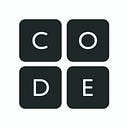On a sunny August evening, a few dozen high school students logged into Zoom for a final presentation. The showcase was the culmination of two months of work, which led students through a rigorous process of conducting research on a topic of their choice, developing a prototype, turning it into a wireframe, and then putting it all together using Javascript to create a working app. Now, it was time to show off.
One by one students shared their creations, all of which had a social justice theme — there were apps about police brutality, mental health awareness, financial literacy, human trafficking, environmental sustainability and COVID-19 statistics.
Some apps featured links to petitions, multiple screens with information and definitions, lists of hotlines and resources, and even games. Although the students were separated by screens, everyone listened carefully to the presenter and asked thoughtful questions. It was clear they were engaged in their work, and each other’s presentations.
“Since I started learning about this issue, it would be amazing to share it with my classmates,” said one teenage girl as she explained her app, which offers resources on how to handle street harassment. “I want my community and my school to become more aware of what this is and how damaging it can be.”
When presentations concluded and the final session of the summer came to a close, one of the instructors enthusiastically called out individual students and their work by name. “I just want to thank everyone again for their hard work this summer — you all made some amazing apps,” she said. “Seriously, don’t be a stranger! Please reach out to me if you need anything at all!”
A grid of faces appeared on the screen, all waving goodbye to each other from their bedrooms. The two-month long course had ended, but it was clear that for some of these students, studying computer science would last a lifetime.
How STEM Kids NYC creates thoughtful computer scientists
The high schoolers were part of a summer workshop run by STEM Kids NYC, a non-profit based in New York City that provides year-round intensive STEM education programs for pre K-12 students. The organization works with a number of schools and community organizations to host weekly in-school, after-school, weekend and summer workshops on computer science and other tech-related fields.
In light of school closures caused by COVID-19 and the protests for racial justice following the death of George Floyd — a Black man who died in May after being restrained by police officers in Minneapolis — the organization’s priorities shifted to focus fully on summer coding camps and making apps with a social justice theme using Code.org’s App Lab. App Lab is geared towards students ages 13 and up and offers a programming environment where students make simple apps in JavaScript with blocks or text.
“[The incorporation of a social justice theme within the summer camps] came in response to what the whole world has been going through,” said organization founder Yvonne Thevenot. “I had to take a step back and think, ‘What can the STEM Kids NYC response be?’”
STEM, social justice and activism
In July the organization launched its “Summer of STEM, Social Justice, & Activism” camps for students ages 4–19. Around 125 students were enrolled in seven camps, and while the majority of students were located in New York, some called in from as far away as Ohio, Tennessee, Alabama, and Texas. At least one student, despite the time difference, participated from Turkey.
The goal was to teach students about how to conduct research using search engines such as Google Scholar, Junior Safe Search or Newslea, and then design and build an app around a social justice topic using App Lab in just two months. Students as young as five did a modified version of the camp using Code.org’s Game Lab.
Thevenot says the camps began by asking students an open-ended, thought-provoking question: What do you feel is unfair in the world that you would want to change?
“We began the workshops by brainstorming a number of social justice ideas, and then we taught students how to conduct research,” Thevenot said. “The goal was to show them that activism takes planning and forethought.”
From there, groups met regularly with their instructor, who walked students through the research, wire-framing, and design and development process.
“Our intention is that students can gradually come up with their own ideas and work through things their own way,” Thevenot says. “They develop their own research questions and then ultimately an app to address that issue.”
Thevenot is a former IT professional with a graduate degree in education from the University of Southern California and the Teachers College at Columbia University, where she is also a researcher. She founded STEM Kids NYC in 2015 as a way to help students build marketable skills and reduce their risk of becoming impoverished, going to jail, or being shut out of the future jobs market, according to the organization’s mission statement. Since then, STEM Kids NYC has reached nearly 800 students through seven programs at 23 school and community-based locations.
“STEM Kids NYC gives students from underserved areas the computer science skills to address issues in their community,” said Thevenot. “These programs empower students by giving them a voice to speak on issues that are important to them, and could ultimately lead to change and transformation in their community — plus learn a marketable skill on top of it!”
As students resume classes this fall, Thevenot says STEM Kids will continue to support its school and community-based clients and families through virtual after-school or extension programs.
You can learn more about STEM Kids NYC on their website or follow them on Facebook or Twitter.
-Kirsten O’Brien, Code.org
